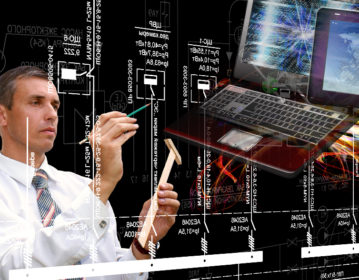
In the ever-evolving landscape of enterprise technology architecture, we find ourselves at a critical inflection point for enterprise resource planning (ERP) systems. The AI revolution isn’t just knocking at the door — it’s fundamentally transforming how businesses operate and make decisions.
As business leaders, we face a profound strategic challenge that extends beyond typical technology upgrades: Should we invest heavily in a complete ERP replatforming or attempt to derive additional value from existing systems for another 2-3 years? Per a recent Forbes article, “IDC forecasts that by 2027, it is anticipated that 75% of global business will begin replacing traditional monolithic ERP systems with modular solutions —driven by the need for enhanced flexibility and scalability in business operations.”
According to Gartner predictions , by 2028, at least 15% of daily work decisions will be made autonomously using Agentic AI — a dramatic shift from zero percent in 2024.
It’s clear we’re at a crossroads, and deciding which path to take will have a significant impact on business outcomes — both in the short term and in the long term.
The revolutionary potential of AI in ERP
The transformation potential of AI in ERP systems is remarkable and virtually unlimited. According to Information Week’s analysis of SAP’s future, we’re moving toward an enterprise ecosystem where automation will revolutionize core functions:
- Accounts payable, receivable and procurement will operate largely autonomously.
- AI-powered chatbots will handle vendor inquiries with unprecedented efficiency.
- Machine learning algorithms will precisely match invoices against purchase orders.
- Natural language processing will streamline supply chain communication.
Industry analysts suggest this level of automation could reduce manual effort by 70-80% — and this isn’t a distant future, it’s unfolding now.
However, this single-system approach requires a major replatforming, with extended planning and implementation timelines making it so that benefits may not be realized for months or even years.
Current challenges and realities of AI readiness
Recent research reveals some compelling statistics about the current state of ERP systems’ transformation and AI readiness:
- A Rootstock AI Survey shows 82% of manufacturers surveyed are increasing AI budget with the rising need for AI-ready ERP solutions.
- In the same survey, 56% of manufacturers expressed uncertainty about their ERP systems’ readiness for AI integration
Such findings highlight the need for near-term solutions, also demonstrating that simply migrating one piece of the total value stream doesn’t ensure end-to-end automation and AI, nor does it guarantee the wide-scale user adoption and organizational change required for ultimate success.
Strategic pathways to modernization
Leveraging AI-powered customization
TechTarget’s recent analysis of ERP trends highlights a crucial opportunity: Organizations can leverage AI to create targeted solutions that connect to existing ERP systems through APIs. This approach enables specific optimizations without requiring a complete system overhaul “as buyers seek modernization, efficiency and faster implementation.”
Revolutionizing user experience
Experience is the core catalyst and driving force of success. Simply building it, and hoping people will come, is best left to the movies. According to Forbes’ examination of ERP customization in 2025, organizations should focus on developing role-based customizations that include:
- Personalized dashboards reflecting specific job functions
- Intuitive navigation that reduces cognitive load
- Seamless integration across all touchpoints
Taking a design-thinking and outcomes-based approach to the ultimate deliverable required, and then working back into the technology layers required, allows enterprises and their enterprise architecture groups to contribute to a solid review of current investments and guide the design of the new, AI-enhanced digital service architecture.
Charting the path forward
As Michael Park from ServiceNow astutely observes, “AI in core systems is merely a new capability, a tool to be employed. The bigger strategic imperative is using these new capabilities to redefine the status quo for exponential value creation.”
For leaders navigating this transformation, consider this strategic approach:
- Begin with targeted AI-powered add-ons.
- Make user experience and adoption top priorities.
- Focus on strategic, incremental improvements.
- Cultivate a culture ready for data-driven, AI-enhanced decision-making.
Rimini Street can assist you in leveraging this approach, right now, with our partnership with ServiceNow and our enterprise software and ERP experts from Rimini Consult™.
What the future holds and what to do tomorrow
The future of ERP isn’t about overnight system replacement — it’s about intelligent, strategic evolution. The AI revolution in ERP is here, and the question remains: Will you lead the charge or fall behind?
And once you decide to move forward, what is the best path, how do you get started and what questions do you ask?
This is part of what we’ve been doing at Rimini Street for the past 20 years, helping organizations and senior leaders review all the data, look at current enterprise software investments and then chart a path forward, something we call the Rimini Smart Path™, toward a more optimized and efficient future.
Key takeaways
The AI evolution is here, fundamentally changing the way we use ERP systems for daily operations and decision-making. Business leaders must navigate the evolving landscape and determine the best path forward for increased efficiency and productivity. The experts from Rimini Consult can help you leverage ServiceNow to maximize the value of your existing enterprise systems and reap the benefits of AI — sooner rather than later. Learn more about our services and schedule your complimentary ERP assessment here.
Sources
– Oyku Ilgar, “2025 Cloud ERP Trends According To Industry Giants,” Forbes, retrieved 19 April 2025 from https://www.forbes.com/sites/sap/2025/01/21/2025-cloud-erp-trends-according-to-industry-giants/
– John Appleby, “The Future of SAP: AI-Driven Process Change,” Information Week, retrieved 19 April 2025 from https://www.informationweek.com/machine-learning-ai/the-future-of-sap-ai-driven-process-change
– Tammy Delatorre, “ Rootstock’s AI Survey Shows 82% of Manufacturers Increasing AI Budgets for 2025 with Rising Need for AI-Ready ERP Solutions,” Business Wire, retrieved 19 April 2025 from https://www.businesswire.com/news/home/20250114413118/en/
– Christine Campbell, “9 ERP trends for 2025 and beyond,” TechTarget, retrieved 19 April 2025 from https://www.techtarget.com/searcherp/feature/ERP-trends-for-this-year-and-beyond
– Andrei Kasyanau, “ERP Customization In 2025: How To Go From Silos To Scalable,” Forbes, retrieved 19 April 2025 from https://www.forbes.com/councils/forbestechcouncil/2025/01/09/erp-customization-in-2025-how-to-go-from-silos-to-scalable/
– Kelly Raskovich et al. “The intelligent core: AI changes everything for core modernization,” Deloitte, retrieved 19 April 2025 from https://www2.deloitte.com/us/en/insights/focus/tech-trends/2025/tech-trends-impact-of-future-state-it-core-modernization.html
– Fragile To Agile, “How Enterprise Architecture Enables Advanced Analytics,” LinkedIn, retrieved 19 April 2025 from https://www.linkedin.com/pulse/how-enterprise-architecture-enables-advanced-analytics-tnxqc/





















